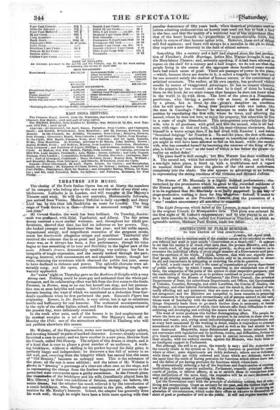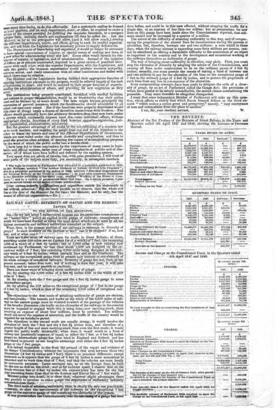SIdgcl_ , fg I AKVIT BLIC fiV§024,: :" ' OB , ,..e- ,
F.: •a , ' TO THE EDiTcHt OF THE SPRCTATOTR“. - - Stu—Permit me to menr'-ii'on."'soM7/Poiti ti reinnter cansea' :14446aisgir,her,oi§AchPieilito18waffich. you referred last week in your article ‘‘: gait' nient atga*tdse till," It appears , to me that the matter is of much older date than theTprensjs4;Mhtistry, and, like the couch-weed, of deep root anifsittensive growth; ant0-.,...id extensive as to overcome the individual efforts of . eg single membernirnent.and pars- /3 lyze the exertions of the whole. Ink, however, thR5 loWilaur signally prac- tical people, the points and difficulties reqffire only tole;4;buneiated. to secure its aid and concurrence in mitigating or removing the evilefekeue.stion. In brief, a main cause of evil is the wnni of orgassizationabe every department of public authority; by which 1 mean, according to the ottaPlished use of the term, the adaptation of the parts of the system to their respective purposes, and the combination of those parts so as to produce combined or general action. The evil runs through the Houses of Parliament,* the Privy Council, . the principal Departments of State, the subordinate Departments and Offices, the Governments of Colonies, Counties, Boroughs, and other Localities, the Courts of Justice, the Magistracy, and other Inferior Jurisdictions; and the result is, that instead of mu- tually affording aid and assistance, they are more or less straining each other if not antagonist; and the Ministers are compelled to have recourse in preparing their measures to the special and extraordinary aid of parsons unused to the task, whose want of familiarity with the merits and defects of the existing state of things frequently leads them to go much further than is necessary, or beside the occasion; in consequence of which, their labours offer fresh difficulties in con- solidating and developing and utilizing the means which we have. The want of union produces this further disintegrating effect. The people, for whom the laws are made, discern not the purpose in its relation to their own in- terests and wants; and, crying aloud indiscriminatingly at every imperfection and at every hurt occasioned by the working in detail, render it imprudent to attempt amendment at the time of outcry, lest the good as well as the bad should be at once destroyed. Meanwhile, many disinterested persons, better informed, but not conversant with legislation and its incidents, means, ad difficulties, ffirbear to give timely assistance; leaving the field open to special interests, whichdirect their attacks, with too uniform success, against the Minister, who finds little or
no intelligent support in Parliament. .
But although the evil is so great, the remedy is easy; and the materials for the remedy reside in the system as it is. Every function is provided for some- where or other: some departments are richly endowed; others are as deficient; while those which are richly endowed and those which are deficient, have at the same time the merit of having provision for functions which others have not, and the defect of not having provision for functions which others have. By systematically collating a list of the functions and functionaries of existing institutions, whether superior authority, Parliament, cannel's, principal officers, courts of justice, or inferior officers, so as to exhibit them in comparison with other institutions of the same kind, the requisites will be at once disclosed, as well as all existing means of providing for them.
Let the Government start with the principle of abolishing nothing, but of com- bining and reorganizing. Grant an amnesty for the past, and the victims high and low of the present system will concur with the greatest readiness in producing an alteration of circumstances, which make their offices as irksome to themselves as short of good or productive of evil to the public. It will not require months, nor
easa. many blue books, to do this effectually. Let a systematic outline be framed 4.4aaid qparters, and let each department, ,court, or office, be required to make a reerS'Of the means provided for fulfilling the requisite functions, in a compact tabular forin, emitting details and explanations till they be called for. Let the Ministry, as far as the prerogative will allow, (and it will allow much,) develop the different departrnents, courts, and offices, giving to each its needful organisa- tion, iM ask IOC the Legislature the necessary powers to supply deficiencies. The Departments r4 State, being *ell organized, it would no longer he necessary to have special commissious of inquiry, or special meansof making new laws, or a weleoffice-for Administering every new law. Every office would furnish its con, Lawent of inquiry;*.legislation, and of administration. Instead of the isolation of Offices as at present constituted, deprived to a great extent of prattles-tinter- course with each other, with the snpenor Departments, with the Legislature, and with the pnblir, 'the -Waimen. organisation would produce coriimownynipaihy, comnioo Wien, and ready intercourse with all other institutions and bodies with -
which there may be :Manion. . .
The Minister and the Legislature having fulfilled their appropriate function of creating institutions adequate to the purpose, would be relieved largely of the task of legislating in detail, and *Mild be restored tetheir proper functiop of superin- tending the administration of affairs; and prOviding for new exigencies as they anise. The institutions being ptoperly constituted, furnished With needful facilities, and eubjeet to proper respeastabilities, would be so trustworthy that their action needmottie fettered by so much detail.. The laws might become principally the - expression of general purposes, which the functionaries. abOuld admidrster by all asairaud necessary means. ' Nor if the functions.were properlytistribistedtwottld this state of things- trnply a degreeof-diScitition isistenLith'freedOm;m..mTbe officers would practically have .less arbitrary 11ISCE8404,AbaR1:111038-110/1511132, EdILlider a .systffill which continually imposes upon thks,a3P8i ilitradottl,reicera without appropriate checks, functions of every kind howeanr5ppensitsrzlegislative, .judi- mat inquisitorial, adininistrative,'ndrasterial. But the greatest advantage of all erotild lih'ilh‘lestiiblt.diing of a common law arts .such matters, and enabling the tigarldn&ial. of the kingdom to the
other to know the nature and useitif e }he' entS of Government,
which are DOW veiled under the pieSent ,ciatiplitsatien; and thus to avoid the practice often adopted, of 'denying ,ibillindikektfitathipliediiiieparposes by. the ArAnt of which the public suffer loss aohiniasedfold.t,VE!, 144114, been led to these uonchieioni.by theyhitiiirieeta.bf,iitany years in legis- lat,ive.nod.p@.cial. matters; wider men of everyileoMphisidn:nf politics' and of cha- racter; all-Of whom have been baffled and defeated by the 4h:40g:system, - -Yenr,space does not adm4 of details;. 44,,,fwit,Ipaimir,pgiRisaion, I will treat of some parts of the subject More, (Oh, yekaiipiiWy„ in,aub&anuent numbers.
S.
* The topic iu relation to PatilliarteVrittili+ in a pampittershed in 1829,
by Mr. Wielsens, lontlUed tt The fu er.D Icat Labotir tntii lfe Proposed " also in a pamphlet published to time spring of DIA 'faithlect t‘..Pructiaal Suggestions flop the Internal Reiorrn ,gt.. the, Peat Commons"; by your own elaborate Supplement to the Si,ei;411.6,•iiiitilliliO1ittthe'Larrie year, emitlU "Iroffang or the Hotise of Coin- moos"; and by a VatietS• ok publications *Mee that time. On a future occasion, I pre pose to advert briefly tietheSopte.s of .:those publications,
- -
• [Oar cqrrespondent*.nmilifigations and experaice. entitle his statemenfs to the intimat attention. ' =dm must permit us to observe, that the whole evil lies at the door of the Minister for the time: the Minister, and he only, has the means of effectual orgardzation.-En.]



























 Previous page
Previous page